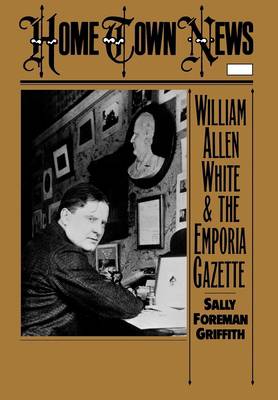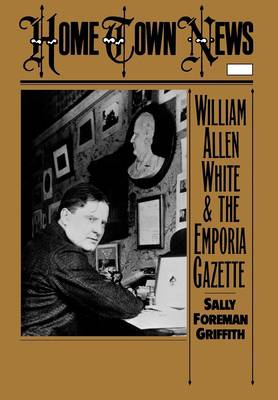
- Afhalen na 1 uur in een winkel met voorraad
- Gratis thuislevering in België vanaf € 30
- Ruim aanbod met 7 miljoen producten
- Afhalen na 1 uur in een winkel met voorraad
- Gratis thuislevering in België vanaf € 30
- Ruim aanbod met 7 miljoen producten
Zoeken
Home Town News
William Allen White and the Emporia Gazette
Sally Foreman Griffith
Hardcover | Engels
€ 96,95
+ 193 punten
Omschrijving
In 1895, a 27-year-old journalist named William Allen White returned to his home town of Emporia, Kansas, to edit a little down-at-the-heels newspaper he had just purchased for $3,000. "The new editor," he wrote in his first editorial, "hopes to live here until he is the old editor, until some of the visions which rise before him as he dreams shall have come true." White did become "the old editor," remaining with the Emporia Gazette until his death 50 years later. During his long tenure he gained nation-wide fame as an author, political leader, and social commentator. But more than anything else, he became the national embodiment of the small-town newspaperman and all the treasured virtues that small towns represented in the minds of Americans.
Home Town News is both a fascinating biography and a compelling social history. As Sally Foreman Griffith shows, White's popular image--kindly yet crusading, fiercely independent yet deeply rooted in his community--doesn't do justice to the man's complexity. Shrewdly carving out a position of leadership in a faction-torn town, White carefully shaped his paper's vision of its community to promote local economic growth, Republican political control, and social harmony. With his emergence as a leader among Midwestern progressives, he carefully adapted the ideas and rhetoric of small-town boosterism to changing economic realities. The book uses White's career to help us understand the role of journalism--and the journalist--in turn-of-the-century American culture. Far from being a simple chronicler of daily events, the small-town newspaperman carried considerable weight in his community. He was a leading force in local business, a galvanizing influence in civic life, and a key political activist. As giant corporations came to dominate the national economy, the newspaperman played a pivotal yet ambivalent role in the resulting social transformation: he sought to preserve local autonomy even as his paper introduced his readers to mass-produced consumer goods.
Home Town News also tells the story of Emporia, Kansas, during this period of social change. Its richly textured descriptions of small-town life take us beyond abstractions like "modernization," "progressivism," and "boosterism." As we observe the Emporia Street Fair of 1899, the heated controversy over the morality of a local doctor in 1902, and the elaborate campaign to build a Y.M.C.A. in 1914, we gain new insights into the processes that have shaped modern America.
Home Town News is both a fascinating biography and a compelling social history. As Sally Foreman Griffith shows, White's popular image--kindly yet crusading, fiercely independent yet deeply rooted in his community--doesn't do justice to the man's complexity. Shrewdly carving out a position of leadership in a faction-torn town, White carefully shaped his paper's vision of its community to promote local economic growth, Republican political control, and social harmony. With his emergence as a leader among Midwestern progressives, he carefully adapted the ideas and rhetoric of small-town boosterism to changing economic realities. The book uses White's career to help us understand the role of journalism--and the journalist--in turn-of-the-century American culture. Far from being a simple chronicler of daily events, the small-town newspaperman carried considerable weight in his community. He was a leading force in local business, a galvanizing influence in civic life, and a key political activist. As giant corporations came to dominate the national economy, the newspaperman played a pivotal yet ambivalent role in the resulting social transformation: he sought to preserve local autonomy even as his paper introduced his readers to mass-produced consumer goods.
Home Town News also tells the story of Emporia, Kansas, during this period of social change. Its richly textured descriptions of small-town life take us beyond abstractions like "modernization," "progressivism," and "boosterism." As we observe the Emporia Street Fair of 1899, the heated controversy over the morality of a local doctor in 1902, and the elaborate campaign to build a Y.M.C.A. in 1914, we gain new insights into the processes that have shaped modern America.
Specificaties
Betrokkenen
- Auteur(s):
- Uitgeverij:
Inhoud
- Aantal bladzijden:
- 304
- Taal:
- Engels
Eigenschappen
- Productcode (EAN):
- 9780195055894
- Verschijningsdatum:
- 5/01/1989
- Uitvoering:
- Hardcover
- Formaat:
- Genaaid
- Afmetingen:
- 164 mm x 241 mm
- Gewicht:
- 607 g

Alleen bij Standaard Boekhandel
+ 193 punten op je klantenkaart van Standaard Boekhandel
Beoordelingen
We publiceren alleen reviews die voldoen aan de voorwaarden voor reviews. Bekijk onze voorwaarden voor reviews.











